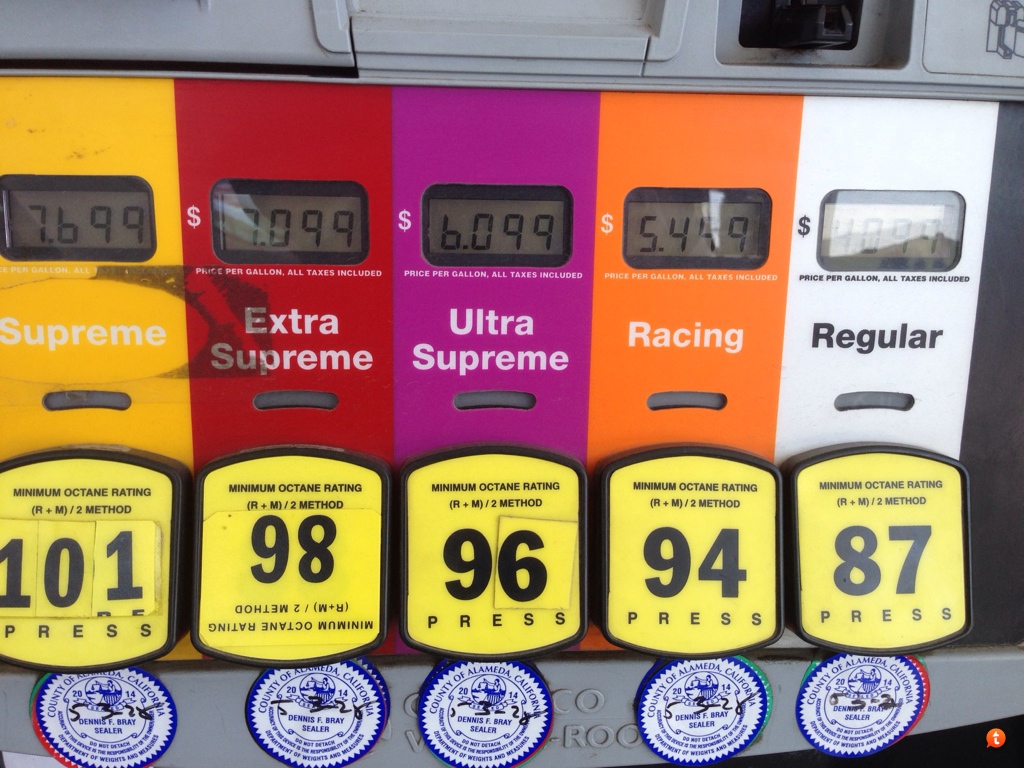How many times have we seen this question asked? The resounding answer to that question is “NO”, but have you ever stopped to wonder why the answer is no? What is octane and why can I tune for higher power levels because of it? What will happen if I use a lower octane fuel than what I was tuned for?
What is octane?
The short answer is that octane is the measure of how much compression a fuel can withstand before pre-igniting.

The animation above illustrates the four-stroke cycle of a single piston in a gas internal combustion engine. During the 1st cycle, the right tube (known as the intake valve) opens up while the piston simultaneously moves down. This brings a mixture of air and fuel (represented by blue) into the cylinder. During the second cycle, the piston moves up, compressing the air and fuel, increasing the temperature and pressure in the cylinder. The third cycle begins after the air/fuel mixture is ignited by the car’s spark plug. It’s during this cycle that the energy is created to power the car. The force generated by the exploding air/fuel mixture pushes the piston down, turning the car’s crankshaft, and ultimately propelling the car into motion. This is followed by the fourth cycle where the piston moves back up and pushes what’s left of the combusted air/fuel (known as exhaust and represented by brown) out of the left tube, or exhaust port. Then the cycle starts all over again.
So what does this have to do with octane?
Everything, actually. As mentioned above, the higher the octane rating, the more the fuel can withstand greater pressures without pre-igniting. This allows for a variety of options that can increase power and efficiency. These options include increasing the compression ratio, increasing boost pressure, changing the timing of spark ignition, injecting less fuel into the cylinder, and more. Additionally, engines designed to work with higher octane also burn the fuel more completely getting the most bang for the buck for each power stroke.
With that knowledge in hand, we can now come back to those numbers — 87, 89, and 93. 87 is the standard octane rating that most car engines are designed for. Or put another way, an octane rating of 87 or higher can withstand the compression ratios used in most cars. Anything lower and you risk engine damage as a result of pre-ignition or knocking — processes that occur when the compression ratio generates more pressure and heat than the fuel can handle, causing it to combust early and push down against the piston while it is still moving upward during the compression stroke.

And since 87 is the standard octane rating for the fuel most engines use today, the 89 and 93 octane rated fuels are only different because they can handle more heat and pressure before igniting on their own. This, in turn, means they can run in performance engines designed to use higher compression ratios. It also means that while higher octane fuels won’t hurt engines designed to run on 87 octane fuel, they generally don’t provide much of a benefit either.
So, to summarize, the additional power that you get from a 93 octane tune has very little to do with the fuel itself other than being able to take advantage of the fact that the higher octane allows for more aggressive tuning parameters because the fuel will not pre-ignite when compressed at higher levels. More compression = bigger bang. The reason why you should never run a lower octane fuel on a vehicle tuned for higher octane fuel is because the tune has no way of detecting what fuel you are using and will continue to operate assuming you put in the correct fuel. This means that you increase your chances of blowing up your engine due to pre-ignition events that the tune cannot compensate for. You can run higher octane fuel, which on a car with a continuous variable valve timing system in place will yield a little benefit, but you should never run a lower octane fuel than what you were tuned for.
Update:
Meanwhile on other fronts…
Higher-Octane Fuels Are Under Development, Report Says – Motor Trend
Electric powertrains, lightweight materials, and improved transmissions are among the many technologies automakers are touting to increase fuel economy in their vehicle fleets. But the industry has yet to take advantage of higher-octane fuels, which could become an important way for boosting efficiency in the future.Automakers and oil companies are quietly working on higher-octane fuels and engines …










Has one comment to “Can I run my 93 octane tune on 87 octane fuel?”
You can leave a reply or Trackback this post.
MetylPhreek - 04/09/2023 at 9:34 pm
I heard that using lower octane gas can cause serious issues with regulating the pressure within the fuculator valves, which can cause the blinker fluid to leak. You don’t want this to happen, once those fuculators go out, and the blinker fluid reservoir goes dry, that’s when b.s. sensors (blinker stability, what did you think it meant?) go haywire, and could lead to total engine failure. I don’t know much about cars, but my mechanic just charged me 3400 dollars for these repairs I was just talking about,and he says he has been working on cars for over 20 years, and he had said it’s because I should have been using higher octane gas , you live and learn I guess. It’s just a good thing I have such a knowledgeable,no nonsense, trustworthy mechanic, otherwise I could have had to buy a whole new car, at least that’s what he said.